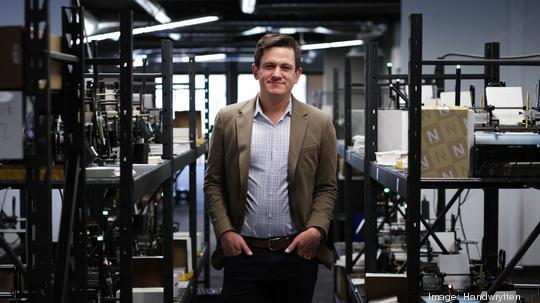
The robots have learned to write. David Wachs, the CEO of Phoenix-based Handwrytten — a personalized note writing company — built and programmed them specifically for that task.
“I wanted to send all my employees and my great clients handwritten notes to thank them for being a client,” Wachs recalled about when he worked at his previous company. “I'd walk into my clients' offices or walk into my employees' offices, I'd see handwritten notes that they received, not only read but put on display.”
Through the emails, tweets, and texts of everyday life, Wachs found people genuinely valued a keepsake of being appreciated. Determined to capitalize on this idea, he decided to start writing notes himself.
“I started sending the handwritten notes when I left that company,” Wachs said. “Then my hand cramped, or I ran out of stamps, or I got distracted and then have to start the notes over. I just thought, geez, there has to be a better way!”
He came away from that experience thinking there has to be an automated process to create thank you notes for customers. In addition, he devised a goal to create a platform for sending handwritten notes and have it integrated in a company’s customer relations management software.
Wachs, a serial entrepreneur, launched Handwrytten in 2014. It uses proprietary, patent-pending robots — currently there are about 115 of them — that are built in the company's Phoenix facility to create handwritten notes.
“The robots hold a real pen,” Wachs said. “It's a Pilot G two ballpoint pen, you can pick them up at Staples.”
Robots don’t always destroy jobs; sometimes they create them. Since its launch, Handwrytten has created 30 jobs. This year, the company plans to hire around eight engineers, software developers, operations reps, and quality assurance reps.
Last year, Handwrytten generated $3 million in revenue, despite the Covid-19 pandemic. Wachs projects the company will make $5 million in revenue in 2021, most of which he plans to reinvest into expansion.
Handwrytten was No. 148 on the 2020 Inc. 500 list, an annual rankings of the fastest-growing privately held companies in the U.S.
Wachs’ clients vary from the traditional family or businessperson to high-profile executives in social media companies.
When Wachs started researching how companies automate note writing, he noticed they utilized laser printers that make the letters look manufactured. He decided that wasn’t a viable solution for his business. In his mind, the pen had to be dragged onto the paper for the penmanship to look nuanced and realistic.
“What happened was when we went about the — I hate to use the term, but everybody uses it — ‘the journey’ of creating our own robot, we hired a consulting firm,” Wachs said.
He ended up working with a Mesa-based engineer to create the company's first robots. The robots weren’t cheap — machined aluminum carries a hefty price — but the prototypes got them into the business.
Wachs invested $250,000 in personal savings from the sale of his previous company Cellit, a mobile technology company, in 2012, to launch Handwrytten. The company became profitable in 2018.
It took a mechanical engineer graduate from Arizona State University, now the company's engineering lead, to suggest 3D printing robot parts for Wachs to realize he could cut the middleman and maximize his profits. Now, he creates all his robots in-house, for pennies on the dollar.










